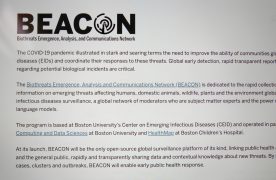Career fairs, resume-building workshops, advising sessions — all of these are useful tools to get college students ready to leave the safety of their university bubble and enter the daunting workforce. Institutions like Boston University offer these resources so that the jump from a student to an employee doesn’t seem as steep.
When it’s the career fair season, students get dressed in professional clothing, break out their resumes and layer on the charm to leave a positive impression on a potential employer. The opportunities that colleges provide students with are almost essential to their futures. This semester, BU has a new addition to their repertoire of resources for students’ career searches.
The Center for Career Development is holding the spring semester’s career fair today in the Metcalf Hall, but this semester, the university implemented a new program to foster efficient navigation of the room, according to an article from BU Today. Fairs App, which is also used at several other universities across the country, is now available for BU students to download. The app includes company profiles, biographies of the representatives and an interactive map of where each business is located in the room, features that will hopefully help students navigate the career fair.
It will always be in the university’s best interest to provide these career resources for their students. When potential applicants are touring colleges and attend an information session, one overly involved mom will inevitably ask what the job placement rate is. A university that can say that more than 90 percent of their students leave their senior year with a job lined up will get a better reaction than one that has a 60 percent placement rate. This statistic appeals to potential students (and their overbearing parents), leading to more acceptances. It isn’t required for a university to offer an exceptional amount of resources, but it will reflect better on their reputation and student body.
The purpose of a career fair is to give students the opportunity to introduce themselves to companies for possible employment. This new application seems to just streamline that process and clarify the career fair’s layout. Normally it would be the student’s responsibility to research a company online and take an initiative to find a position that fits their experience and expertise. This app, like all other apps, attempts to make our lives easier. However, it can potentially take away an integral part of the job searching process. Students should be expected to spend more than a few minutes scrolling through an app to find a job or internship. What happened to the responsibility of keeping yourself informed? This can cut down on time, but hopefully students will understand that these little tidbits of information don’t replace the entire process of finding their dream job.
This application is BU’s newest resource to help their students in the job finding process. The university already has many options including Handshake, however aggravating it may be for students to start their search. But at some point, students have to continue their quest on their own. Students can’t expect their university to handle the entire process of searching for and ultimately applying for a position. BU offers plenty of resources for students in need, and it is up to them to take advantage of those opportunities. It falls onto the student to pursue help from the university, should they require it.
Times have changed. When our parents left to attend university, they went to learn, experience new things and leave their childhood homes. Nowadays, the main thought in students’ minds is how our experiences will improve our resumes and what grade point average will earn us a decent job upon graduation. Simply having a bachelor’s degree no longer guarantees a job offer. When we’re paying more than $60,000 to receive an education, we have certain expectations of the opportunities we’re exposed to, especially opportunities to find a future career. While the university should be using their resources to connect their students with potential employers, even if they’re not entirely responsible to do so, available resources mean nothing when students don’t have the motivation to pursue them.
For motivated college students, utilizing what the university has to offer isn’t limited to going to workshops and career fairs hosted by the university. One vital skill that universities don’t directly teach us — though they do provide us with the means to learn it — is networking. Being able to network is crucial to finding jobs, perhaps even more so than the standard meet-and-greet at a fair where you’re just one name on a list, one face in a crowd. This way you make connections through who you know and trust, rather than a career counselor who isn’t particularly aware of your strengths and particularities. When it comes to landing a job, the university can only help us so much — the rest is on our shoulders.













